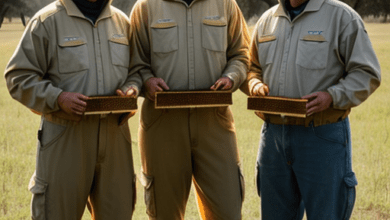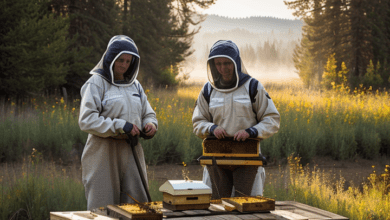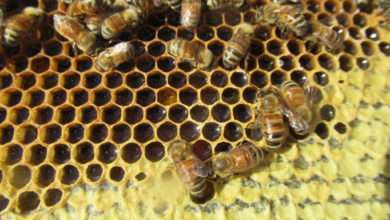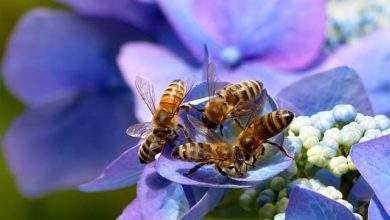A Beekeepers Guide to Essential Oils
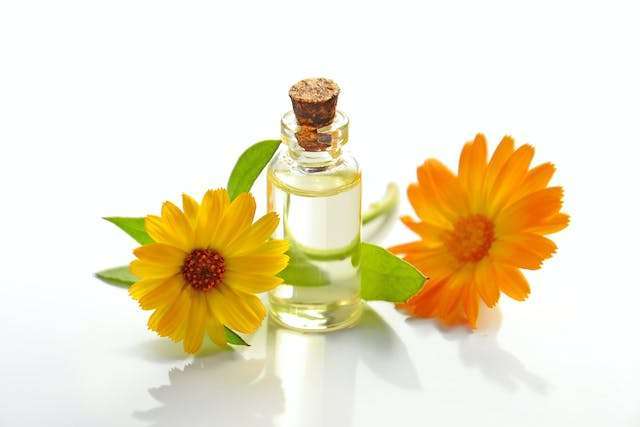
Essential oils have long been used for their therapeutic properties, but did you know that they can also benefit your bees?
In this article, we will explore the world of essential oils and uncover how they can be effectively incorporated into beekeeping practices. From their definition and extraction methods to the various types and unique properties, understanding essential oils is vital for any beekeeper looking to enhance their hive’s health and productivity. So, let’s delve into the fascinating world of essential oils and discover their potential in beekeeping.
Definition and Explanation of Essential Oils
Essential oils can be considered the concentrated essence of plants. They are natural aromatic compounds that are typically extracted from various parts of plants, including flowers, leaves, stems, and even bark. These oils contain the distinct fragrance and characteristics of the plant they are derived from.
It is important to note that essential oils are not the same as fragrance oils, which are synthetic and do not possess the same therapeutic properties. Instead, essential oils are composed of complex chemical compounds that contribute to their unique scent and potential benefits.
How Essential Oils are Extracted from Plants
To obtain essential oils from plants, various extraction methods can be employed. The most common methods include steam distillation, cold-press extraction, and solvent extraction.
- Steam distillation involves passing steam through the plant material, causing the essential oil to evaporate and then be condensed back into a liquid form.
- Cold-press extraction is mainly used for obtaining essential oils from citrus fruits, where mechanical pressure is applied to the fruit rinds to release the oil.
- Solvent extraction, on the other hand, utilizes a chemical solvent to dissolve the essential oil from the plant material.
Different Types of Essential Oils and Their Properties
Essential oils come in a wide array of types, each with its unique properties and potential benefits. It is important for beekeepers to understand these differences to effectively integrate essential oils into their beekeeping practices.
Some common types of essential oils that can be beneficial for both bees and beekeepers include:
- Lavender Essential Oil: Lavender essential oil is known for its calming and stress-relieving properties, making it beneficial for both bees and beekeepers. In addition, it also has antibacterial and antifungal effects, which can contribute to the overall health and well-being of the bees.
- Lemongrass Oil: Lemongrass oil is capable of repelling pests and insects, acting as a natural deterrent against parasites that may harm bees. Additionally, this oil is useful as a lure for swarm traps.
- Tea Tree Essential Oil: Tea tree essential oil boasts powerful antimicrobial properties and supports the immune system health of bees. This makes it an essential oil that beekeepers should consider incorporating into their beekeeping practices.
- Peppermint Essential Oil: The cooling and refreshing aroma of peppermint essential oil makes it a popular choice for beekeepers. It is not only enjoyable for the bees, but it is also effective against common hive pests such as ants.
- Thyme Oil: Thyme oil, specifically the active ingredient thymol, has been proven to control Varroa mite populations. Beekeepers often utilize thymol-based products, such as thymol patties or strips, to mitigate mite infestations in their hives.
- Wintergreen Oil: The presence of methyl salicylate in wintergreen oil makes it effective against Varroa mites, making it a valuable addition to a beekeeper’s Varroa mite control strategy.
- Eucalyptus Oil: Containing compounds with proven acaricidal properties against Varroa mites, eucalyptus oil can be utilized as part of integrated Varroa mite management practices.
The Benefits of Essential Oils for Bee Health
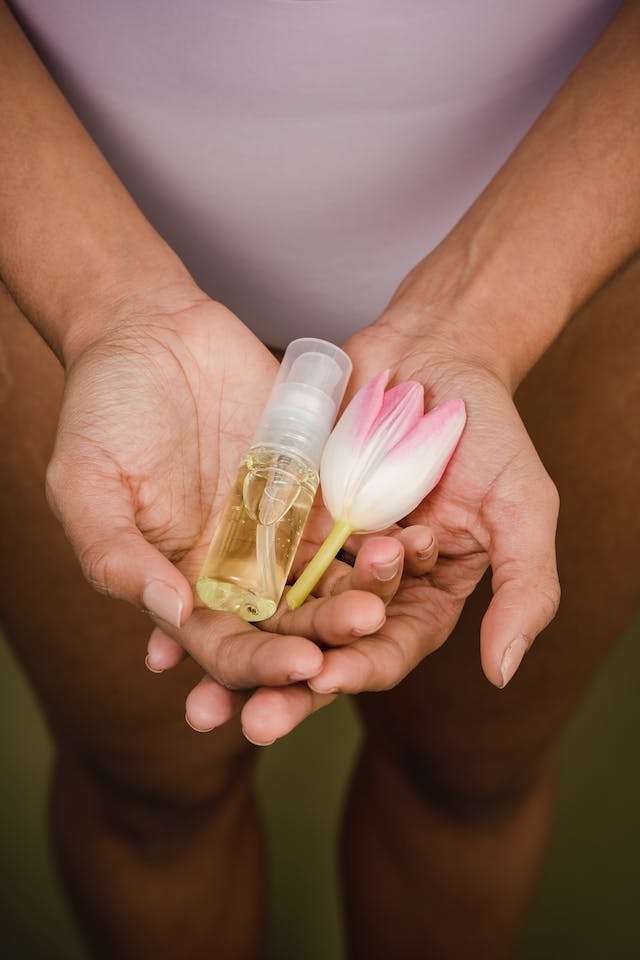
Essential oils have been used for centuries in various traditions for their therapeutic properties. In recent years, beekeepers have started harnessing the power of essential oils to promote the health and well-being of their bees. These natural plant extracts offer numerous benefits, both to the bees and the overall hive.
One significant advantage of essential oils is their antimicrobial and antifungal properties. Bees can face a range of bacterial and fungal infections that can affect their overall health and productivity. By incorporating essential oils into the hive environment, beekeepers can create an inhospitable climate for these harmful pathogens, reducing the risk of disease outbreaks.
Moreover, essential oils can also help repel pests and parasites that may threaten bee colonies. Certain oils, such as lemongrass and thyme, contain compounds that insects find repellent. When used strategically, these oils can deter common hive invaders, such as mites and beetles, minimizing their impact on bee populations.
Additionally, some essential oils have calming and stress-reducing properties, which can be particularly beneficial during times of hive disturbance or transportation. By using oils like lavender or chamomile, beekeepers can help their bees adapt to new environments and alleviate any stress or anxiety they may experience.
Safety Considerations
Essential oils are highly concentrated and potent substances extracted from plants. Although they possess exceptional properties, inappropriate or excessive use can harm not only the bees but also their delicate environment. Therefore, it is crucial to adhere to safety guidelines while incorporating essential oils into beekeeping practices.
To safeguard the well-being of your honeybees and maintain a healthy hive, consider the following safety considerations:
- Quality Assurance: Ensure that you are using high-quality, pure essential oils specifically formulated for beekeeping. Synthetic oils or those adulterated with chemicals can be harmful to the bees and may compromise the therapeutic benefits of the oils.
- Proper Dilution: Essential oils are typically diluted before applying them to honeybees. Dilution ratios depend on the oil and the purpose of application. It is essential to adhere to recommended dilution guidelines meticulously to prevent harmful effects.
- Patch Testing: Before applying any new essential oil to your honeybees, conduct a patch test on a small number of bees and observe their reaction. This step is crucial as individual bees may react differently to various oils, ensuring the safety and effectiveness of the chosen oils for your specific bee population.
Potential Risks and Side Effects to Be Aware Of
While essential oils offer numerous benefits, it is essential to be aware of potential risks and side effects they may pose to your honeybees. Some considerations include:
- Allergies: Just like humans, honeybees can develop allergies or sensitivities to certain substances, including essential oils. These sensitivities can vary from one hive to another, which reinforces the importance of patch testing and observing any adverse reactions.
- Respiratory Irritation: Some essential oils, when used improperly or in excessive amounts, can cause respiratory issues for honeybees. It is vital to provide proper ventilation and avoid overexposure to prevent any potential harm to the bees’ delicate respiratory systems.
Recommended Dilution Ratios and Usage Guidelines
To ensure the safe and effective use of essential oils in beekeeping, it is essential to follow recommended dilution ratios and usage guidelines. These guidelines may vary depending on the oil and intended purpose of application. Here are a few general safety recommendations:
- Dilution Ratios: As a general guideline, dilute essential oils at a ratio of 1-2 drops of essential oil per ounce of carrier oil or water. However, it is always best to consult specific resources or experts for precise dilution ratios based on the essential oil you are using.
- Gradual Introduction: Introduce new essential oils to your bees gradually. Start with lower concentrations and observe their response before increasing the dosage. This approach helps to minimize any potential adverse reactions and ensures the bees’ well-being.
Essential Oils for Common Beekeeping Issues
In this section, we will explore the power of essential oils and their potential to address common concerns in beekeeping. From mite infestations to colony stress reduction, hive cleaning, and boosting overall vitality, essential oils can provide natural and effective solutions for beekeepers.
- Mite Infestations and Disease Prevention: Varroa mites are one of the most common issues faced by beekeepers, as they can weaken and decimate honeybee colonies. Thankfully, certain essential oils possess potent antimicrobial and insecticidal properties that can combat these pesky parasites. Oils such as thyme, clove, and tea tree oil have shown promising results in controlling mite infestations and preventing the spread of diseases in hives. Diluting these essential oils with a carrier oil and applying them as a spray or by using vaporizers can help keep mite populations in check.
- Colony Stress Reduction and Promoting Calmness: Bee colonies can experience stress due to various factors, including environmental changes, transportation, or even honey harvesting activities. Essential oils known for their calming and soothing effects, such as lavender, chamomile, and geranium, can be used to reduce colony stress. These oils can be diffused in the immediate vicinity of the hives, allowing the bees to breathe in the aromatic compounds and promoting a sense of tranquility within the colony.
- Hive Cleaning and Maintaining Hygiene: Maintaining a clean and hygienic hive environment is crucial for the overall health and well-being of honeybees. Essential oils like lemongrass, lemon, and eucalyptus possess antibacterial and antifungal properties that can aid in keeping hives clean and free from pathogens. Adding a few drops of these oils to a sugar or water solution and then spraying it inside the hive can help sanitize the environment and prevent the growth of harmful microorganisms.
- Boosting Brood Development and Overall Vitality: For bee colonies to thrive, it is essential to have a robust brood development and strong overall vitality. Certain essential oils, such as rosemary, ylang-ylang, and bergamot, have been found to promote healthy brood growth and strengthen the immune system of bees. These oils can be added to sugar syrup feeders, allowing the bees to consume them and benefit from their nourishing properties. Regular use of these oils may help boost brood development and increase the overall vitality and productivity of the colony.
Essential oils offer a natural and effective approach to address common concerns faced by beekeepers. From combating mite infestations and reducing colony stress to maintaining hive hygiene and boosting brood development, the power of essential oils is undeniable. By harnessing the potential of essential oils, beekeepers can create a harmonious and thriving environment for their precious honeybee colonies.
Application Methods
Here are some of the different techniques used to apply essential oils in beekeeping.
- Topical Application on Bees: One method of incorporating essential oils into beekeeping is through topical application. This involves applying the oils directly onto the bees themselves. By doing so, the bees come into direct contact with the oils, allowing them to reap the benefits. Beekeepers can create a diluted solution of essential oils and gently apply it onto the bees’ bodies, ensuring not to harm or stress them. Topical application is an effective way to support the bees’ immune systems and promote overall hive health.
- Vaporization and Diffusing in the Hive: Another popular method of using essential oils in beekeeping is through the process of vaporization and diffusing. Beekeepers can utilize vaporizers or diffusers specifically designed for hive use. These devices disperse the oils into the hive, allowing the bees to inhale the aromatic vapors. This method is particularly useful for aiding in pest control and disease prevention. The oils released into the hive help create an environment that is inhospitable to pests, while simultaneously providing the bees with the therapeutic benefits of the oils.
- Spraying and Misting Techniques: Spraying and misting techniques offer beekeepers an alternative method of applying essential oils. With this method, beekeepers can dilute the oils in a liquid solution and use spray bottles or misters to disperse the mixture over the bees and their hives. This allows for a wide coverage area, ensuring that all bees within the hive come into contact with the oils. Spraying and misting essential oils can assist in repelling mites, deterring harmful pathogens, and even improving the overall cleanliness of the hive.
- Adding to Feeding Solutions: One lesser-known technique for incorporating essential oils in beekeeping is by adding them to feeding solutions. Beekeepers often provide supplementary feeding to their colonies during times of scarcity or to bolster their strength. By including essential oils in these feeding solutions, the bees can ingest the oils orally, allowing them to experience their therapeutic benefits from the inside out. This method is particularly useful for supporting the bees’ immune systems and enhancing their overall vitality.
Whether through topical application, vaporization and diffusing, spraying and misting, or adding to feeding solutions, beekeepers have an array of methods to choose from when it comes to incorporating these aromatic oils into their hives. By harnessing the power of essential oils, beekeepers can enhance the health and well-being of their beloved honeybee colonies, creating a harmonious and thriving environment for these incredible pollinators.
Dos and Don’ts of Essential Oil Usage in Beekeeping
When using essential oils in beekeeping, it is crucial to follow important guidelines to ensure effective and responsible usage. What follows are some of the dos and don’ts of using essential oils, allowing you to promote the health and well-being of your bees while avoiding potential harm.
Choosing High-Quality, Organic Oils: To guarantee the best results and prevent any negative impacts on your bees, it is essential to select high-quality, organic essential oils. Here are some key considerations:
- Source: Look for reputable suppliers that specialize in organic essential oils. This ensures that the oils you purchase come from natural and sustainable sources, free from harmful chemicals or pesticides.
- Purity: Opt for oils labeled as 100% pure and free from any additives or dilutions. Pure oils contain the highest concentration of beneficial compounds that can support your bees’ health.
- Testing and Certification: Check for oils that have undergone third-party testing and are certified organic. This provides assurance that the oils meet stringent quality standards and are safe for both bees and beekeepers.
Selecting Oils Safe for Bees and Beneficial Insects: Certain essential oils may be harmful to bees and other beneficial insects if used without caution. Consider the following factors before choosing oils for your beekeeping practices:
- Research: Thoroughly investigate the effects of essential oils on bees and beneficial insects. Look for scientific studies and consult experienced beekeepers to gain insights into which oils are safe to use.
- Bee-Friendly Oils: Prioritize oils known to have positive effects on bees, such as lemongrass, thyme, tea tree, and lavender. These oils have been reported to support the overall well-being of bees without causing harm.
- Avoid Toxic Oils: Steer clear of oils known to be toxic to bees, including pennyroyal, wintergreen, camphor, and pennyroyal. Using such oils can have detrimental consequences on your bee colonies.
Proper Dosage and Frequency of Application: Using essential oils in the right dosage and adhering to a suitable application frequency is crucial for maintaining the health of your bees. Consider the following:
- Consult Experts: Seek guidance from experienced beekeepers or local beekeeping associations regarding appropriate dosage and frequency of essential oil applications. They can provide valuable insights based on their practical experience.
- Start Small: Begin with lower concentrations and gradually increase the dosage if necessary. This allows you to gauge your bees’ response and prevent overexposure to essential oils.
- Follow Recommended Guidelines: Adhere to the manufacturer’s instructions for specific oils, as recommended dosages may vary. Additionally, consider factors such as weather conditions and colony strength when determining frequency of application.
Monitoring Colonies and Observing Adverse Effects: Regularly monitoring your bee colonies and being vigilant for any adverse effects is vital when using essential oils. Here’s what you need to keep in mind:
- Observation: After applying essential oils, observe your bees closely. Look for signs of unusual behavior, stress, or any negative impact on colony health. If you notice any adverse effects, discontinue the use of that particular oil immediately.
- Document and Learn: Maintain careful records of the essential oils used, their dosages, and application dates. This documentation will help you identify potential patterns or issues over time, allowing you to make informed decisions for future use.
- Seek Professional Advice: If you encounter persistent or severe negative effects on your bee colonies, consult local beekeeping experts or veterinarians specializing in bee health. Their expertise can help you resolve any issues and ensure the well-being of your bees.
Following these dos and don’ts of essential oil usage in beekeeping will empower you to use these natural remedies in a responsible and effective manner. By choosing high-quality, organic oils, selecting oils safe for bees, using proper dosages, and carefully monitoring your colonies, you can contribute to the overall health and prosperity of your bees while safeguarding their well-being. Remember, responsible essential oil usage is crucial for maintaining a thriving apiary.
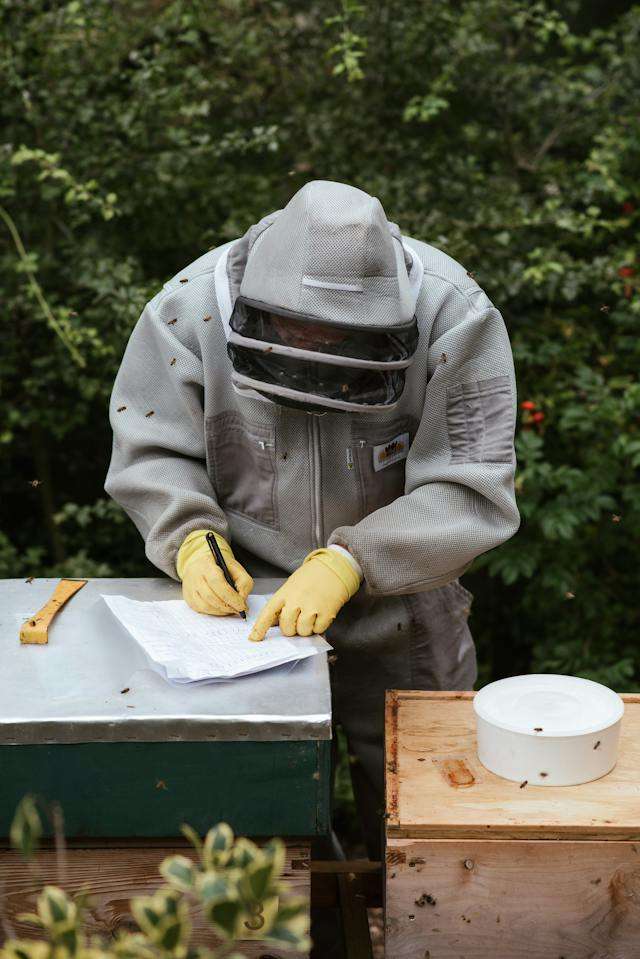
Conclusion
Essential oils can be valuable assets for beekeepers seeking natural and holistic ways to support bee health and well-being. As we continue to learn more about the benefits of essential oils in beekeeping, it’s crucial for beekeepers to stay informed and educated on the best practices for using these natural compounds. With the right knowledge and care, essential oils can be powerful allies in promoting the health and vitality of bee populations, contributing to the preservation and protection of these essential pollinators.
FAQ: A Beekeepers Guide to Essential Oils
What are essential oils, and how are they extracted?
- Essential oils are natural compounds extracted from plants through methods such as distillation or cold pressing. These oils contain concentrated aromatic compounds that carry the distinctive scents and therapeutic properties of the plants they are derived from.
What are the benefits of using essential oils in beekeeping?
- Essential oils can promote bee health and well-being in various ways, such as boosting immunity, repelling pests, and reducing stress and anxiety in the hive. When used properly, essential oils can be valuable tools for supporting the overall health and vitality of bee colonies.
What are some commonly used essential oils in beekeeping, and how are they applied?
- Some commonly used essential oils in beekeeping include tea tree oil, thyme oil, lemongrass oil, and eucalyptus oil. These oils can be applied topically in the hive, as well as through diffusion or spraying. It’s important to dilute the oils properly and take safety precautions to ensure the well-being of the bees.
How do essential oils support the immune system of bee colonies?
- Essential oils such as thyme and tea tree oil have natural antibacterial and antifungal properties, which can help prevent diseases and infections in the hive. By incorporating these oils into the bee environment, beekeepers can support the overall health of the colony and reduce the risk of disease outbreaks.
What precautions should be taken when using essential oils in beekeeping?
- When using essential oils in beekeeping, it’s important to dilute the oils properly, ensure that they do not come into contact with the honey, and take safety measures to avoid contaminating the bee environment. Beekeepers should also educate themselves on the proper techniques and dosage for using essential oils to support bee health.
